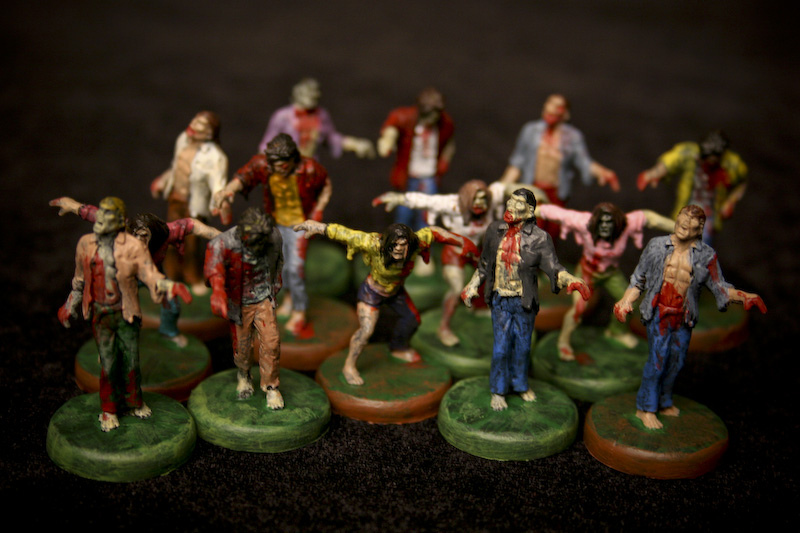In watching
Wanted I kept thinking of
Assassin's Creed. Not just because they are both stories about leagues of assassins, but because they are both stories with a lot of style but not a lot of heart. That sounds cheesy, and in no way do I mean to imply that the film was lacking some awful stock romantic comedy love story. I mean that the story callously blew by some serious events that most humans would stop at. I felt guilty every time Altair needlessly knifed some guard who was just doing his job; similarly I couldn't help but notice the extreme collateral damage left behind by Wanted's Wesley Gibson. Seriously, train wrecks that kill hundreds of innocent bystanders are hard to let slide. I'm a reminded a bit of
Die Hard 2 (which by the way is terrible), where McLane saves the day but somewhere along the way an entire passenger plane of people is incinerated and
nobody seems sad.
Keep in mind that I don't have a weak heart for violence. I play video games, I watch action movies, and I enjoy a good
zombie flick (especially when the good guys lose and everybody dies). I'm properly desensitized, right? Well, there are different types violence. The right setting can make violence contextually appropriate (sometimes entertaining, sometimes funny). Catch the wrong balance and you'll have me actually thinking about what's going on onscreen (which has a place, but only if you have the story and maturity of emotion to back it up). Wanted doesn't completely miss the mark - there are scenes that pull off the action with style or humor. But there were quite a few moments where I found myself thinking "was that
really necessary?"
It's a delicate line. For example, stabbing someone in the eye with a carrot =
awesome. Shooting someone through someone else's eye socket = gratuitous. It's a shame too, because the triumphant march of bad assery leading up to that moment is nothing short of beautiful.
All the chaos surrounding Wesley Gibson's rise to power left me undecided about his character. He's no
lawful good hero, that's for sure. That's fine, I can handle the dark and vengeful hero (hey, it works for Batman). But that doesn’t really fit Wesley either, as he feels far more self indulgent than righteous. I'm not saying that everything has to be black and white good vs. evil, but instead of being complicated everything about Wanted's morality is just plain muddled. They try to fix this by providing a lame back story of The Greater Good, reinforced only by a quick fire-side tale from Angelina, but it doesn't stick.
Apparently this movie came from a
comic book. And in doing a
little research on the comic to film adaptation I began to understand more where the alignment got all out of whack. In the comic The Fraternity is not an order of righteous assassins, but rather a band of super villains. These quotes from the writer about the adaptation help put things into perspective:
"The only thing that they really changed substantially was where the assassins came from, and that does obviously mean a radical change running through it, because suddenly Wesley isn’t a force for evil – in some ways, he’s a force for good"
They changed the justification but let the actions and personality untouched. Maybe it's more palatable by the general moviegoing public, but it doesn't make any sense. Fundamentally, the righteousness is not what Wesley's journey is about. It's about him finding out he's special, standing up for himself, transferring from being shat upon to shitting upon others. It's not like the motivating factor in his transformation is that he found some higher calling to help people. Actually, the turning point is when he checks his bank balance and finds out he's rich (no really, that's the pivotal part for his character - go capitalism). So why bother adding justification to his actions if his journey is inherently self-centered? What was wrong with this being a story about villains?
"if everyone was outright villains, it made it hard to root for the guys, which I could appreciate, but not agree with. The Godfather is all about villains, and you end up rooting for them. You just have to put them against guys who are more evil."
This was another shortcoming for me. Even with the changes they made I didn't really feel like the villain was any more evil than the protagonist. I wasn't rooting for anyone in particular. Which is sad, because that's almost the same as not caring. The more I think about it, the more I realize that I liked the original concept so much more. Most of the things that bothered me during the movie are the same things that were changed in the comic to film adaptation. Guess I'm going to have to give the graphic novel a flip through.
Anyway, when it comes down to it I do always try to judge movies on very basic criteria. Was I entertained? Absolutely. Yes, I realize I just spent many paragraphs talking about stuff that bothered me. But there was totally good stuff in there. I really enjoyed how pathetic Wesley is in the beginning of the movie, hitting a little on that vibe that worked so well for Fight Club and The Matrix. Stylistically the movie had some strong images that are memorable. I had a good time watching it. It just didn't bring anything new or particularly impactful to the table, but that's not always necessary if you're just looking for an enjoyable way to pass a couple of hours.







